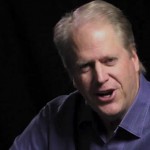 (Be blessed by this DWOD for June 10, 2014 by guest contributor Os Hillman)
(Be blessed by this DWOD for June 10, 2014 by guest contributor Os Hillman)
“During the reign of David, there was a famine for three successive years; so David sought the face of the Lord.” (2 Samuel 21:1a)
There was a famine in the land, and David equated that famine to the blessing or lack of blessing from God. He sought God to know why there was a famine.
The Lord did not take long to answer: “It is on account of Saul and his blood-stained house; it is because he put the Gibeonites to death” (2 Sam. 21:1b). Many years earlier, when Joshua entered the Promised Land, the Israelites were tricked by the Gibeonites into believing they were travelers when they were actually enemies of Israel. The Gibeonites tricked Israel into making a peace treaty with them. It was one of the first major mistakes Israel made after entering the Promised Land.
As a result of the peace treaty, the Gibeonites were kept as slaves to Israel. This was never God’s intention for Israel. He had wanted Israel to destroy all their enemies, but they made an error in judgment that required that they honor a covenant with the Gibeonites.
Saul made a decision to disregard this covenant with the Gibeonites and sought to annihilate them. David sensed there was something preventing God’s blessing on Israel. As a nation they had violated a covenant made before God. Now they were reaping the consequences.
There are two things we can learn from this story.
First, when we make a covenant, God expects us to fulfill it. God is a covenant maker. He made one with Abraham, Isaac, and Jacob. He made one with each of us through Jesus Christ. The Scriptures are numerous regarding the importance of honouring our commitments.
Second, God is a very longsuffering God. He gave Israel many years of grace before He exercised judgment for their sin. However, there always comes a day when God must uphold His standard of righteousness.
Are you failing to walk in God’s blessing due to some failed commitment? Calamities can befall us for many reasons; sin can be one of them.
In the case of Israel, David had to make things right with the Gibeonites. When he did this, God removed the famine, and Israel again was prosperous.
When you feel you lack God’s blessing on your life, ask the Lord if there are any broken covenants in your past—personally as well as generationally. Repent of them. Ask and receive forgiveness. Restore the broken relationships. Make restitution where needed. God may well be waiting on you before He can release His blessing on your life.
(Reprinted by permission from the author. Os Hillman is an international speaker and author of 15 books on workplace calling. To learn more, visit http://www.MarketplaceLeaders.org)









Follow Us